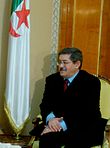Algerian legislative election, 2002
|
|
|||||||||||||||||||||||||||||||||||||||||
|---|---|---|---|---|---|---|---|---|---|---|---|---|---|---|---|---|---|---|---|---|---|---|---|---|---|---|---|---|---|---|---|---|---|---|---|---|---|---|---|---|---|
|
|||||||||||||||||||||||||||||||||||||||||
|
All 389 seats to the People's National Assembly 195 seats were needed for a majority |
|||||||||||||||||||||||||||||||||||||||||
|
|||||||||||||||||||||||||||||||||||||||||
|
|||||||||||||||||||||||||||||||||||||||||
The 2002 Algerian Legislative election was held in Algeria on 30 May 2002 to elect members of the People's National Assembly. The governing National Liberation Front (FLN) won a majority of seats in the election. The election suffered from a low turnout, violence and boycotts by some opposition parties.
The election saw 10,052 candidates standing in the election from 23 political parties. Of the candidates, 694 were female and 1,266 were independents.
President Abdelaziz Bouteflika announced the date of the election on 20 February and the official campaign began on 9 May. The President vowed that they would be free elections and warned people against undermining them. However five opposition parties boycotted the election, the Socialist Forces Front (FFS), Rally for Culture and Democracy (RCD), Republican National Alliance (ANR), Movement of Democrats and Socialists (MDS) and the Socialist Workers' Party (PST). They claimed that previous elections in 1997 and 1999 were fraudulent and that this election would be no different.
A survey carried out by Al-Watan newspaper showed that 70% would vote for one of the 3 parties in the ruling coalition, the FLN, National Rally for Democracy and the Movement of Society for Peace. The FLN of Prime Minister Ali Benflis campaigned on a platform of unifying the different social groups of Algeria such as by regional development in the south. The RND, which had won the most seats at the last election in 1997, campaigned for economic liberalisation but was undermined by the lack of a base of support or a social ideology. The leader of the RND, Ahmed Ouyahia, warned of the dangers of an Islamist victory but his concerns were dismissed by the interior minister. The opposition Workers' Party led by Louisa Hanoune campaigned against outside interference in Algeria and against privatisation.
...
Wikipedia



